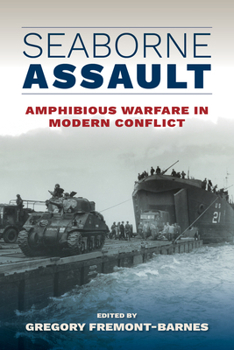Seaborne Assault: Amphibious Warfare in Modern Conflict
Seaborne Assault offers a comprehensive study of amphibious operations, showcasing their challenges and strategic importance through case studies of twentieth-century conflicts.
Amphibious warfare is among the most demanding forms of military operations, requiring precise coordination across land, sea, and air forces. Seaborne Assault examines twelve case studies spanning four major conflicts: World War I, World War II, the Korean War, and the Falklands War. These operations ranged from large-scale assaults, as in the battles of Normandy and Leyte Gulf, to smaller, strategically significant missions such as Operation Albion and the Falklands landings. Each chapter, crafted by seasoned historians, provides a detailed account of planning, execution, and outcomes, offering readers a clear understanding of the challenges involved.
While amphibious operations fall into several categories--assault, raid, withdrawal, demonstration, and support--the book concentrates on the first of these. It addresses logistical hurdles, strategic decisions, and leadership dynamics that shaped their outcomes. For example, the Normandy landings demonstrate the importance of air and naval supremacy, while the Falklands campaign highlights the difficulties of operating far from home. The study of Tarawa underscores the critical role of junior leaders in overcoming obstacles, and Inchon reveals the impact of bold strategic decisions.
Seaborne Assault illustrates the geographic and tactical intricacies of each operation. It also emphasizes lessons learned, such as the necessity of interservice cooperation, effective communication, and adaptability in unpredictable conditions. Whether analyzing the logistical demands of landing forces on hostile shores or the strategic implications of securing beachheads, this book provides valuable insights into the enduring relevance of amphibious warfare. Military professionals, historians, and enthusiasts alike will find this work an essential resource for understanding the complexities of projecting power ashore.
Related Subjects
History




